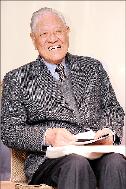Former president Lee Teng-hui (李登輝) yesterday said Taiwan should replace the Republic of China (ROC) Constitution with a new constitution that reflects modern realities.
Lee said the ROC Constitution, enacted in China in 1947, is not suitable for Taiwan and should be replaced by a Taiwan basic law and that ultimately a new constitution should be enacted.
Lee made the remarks during an event organized by Taiwan Advocates in Taipei with four academics who were representatives of a student movement in 1991 known as the Wild Lilies (野百合學運).

Photo: Chang Chia-ming, Taipei Times
Back then, Lee met the student representatives and accepted their four demands, which were that Lee dissolve the now defunct national assembly, abolish the Temporary Provisions Effective During the Period of Communist Rebellion (動員戡亂時期臨時條款), call a state affairs meeting and set a timetable for political and economic reforms.
Four of the representatives met Lee again yesterday and each asked the former president questions about constitutional reform, cross-strait relations and the intricate relationship between the Chinese Nationalist Party (KMT) and business consortiums.
On constitutional reform, Lee said the ROC Constitution was amended six times during his presidency. These amendments, collectively known as the Additional Articles (增修條文), ended the Temporary Provisions Effective During the Period of Communist Rebellion and gave “electors of the free area of the Republic of China” — consisting of Taiwan proper as well as the outlying islands of Penghu, Kinmen and Matsu — the right to vote on constitutional amendments.
“The ROC Constitution is like temporary housing where we have not much choice but to stay there because of Taiwan’s special situation,” he said.
Lee said how the ROC Constitution should be dealt with hinged on the good faith of future leaders and their belief in the country.
National identification was a key component building a -Taiwan-centered consciousness, he said.
With a Taiwan-centered orientation, many problems such as the economy, the Constitution or cross-strait relations would naturally be resolved, he said.
Thirteen years after Lee made his announcement of the “special state-to-state” theory in 1998, many things have changed, he said.
“Taiwan must be stronger and China must change,” he said. “One of the biggest differences between Taiwan and China is that Eastern and Western civilizations co-exist in Taiwan, but this is not the case in China.”
On the KMT’s much criticized close ties with big businesses, Lee said that back then the KMT was rich, with very substantial party assets.
Therefore, it was natural to play the leading role of an investor. Of course, there were advantages and disadvantages, he said.
Asked whether he would have done things different if he had a second chance, Lee said he saw things differently now.
It was true that the KMT was a profit-making business, but the private sector also benefited significantly from the booming economy, he said.

Tropical Storm Gaemi strengthened into a typhoon at 2pm yesterday, and could make landfall in Yilan County tomorrow, the Central Weather Administration (CWA) said yesterday. The agency was scheduled to issue a sea warning at 11:30pm yesterday, and could issue a land warning later today. Gaemi was moving north-northwest at 4kph, carrying maximum sustained winds near its center of up to 118.8kph and gusts of 154.8kph. The circumference is forecast to reach eastern Taiwan tomorrow morning, with the center making landfall in Yilan County later that night before departing from the north coast, CWA weather forecaster Kuan Shin-ping (官欣平) said yesterday. Uncertainty remains and

SEA WARNING LIKELY: The storm, named Gaemi, could become a moderate typhoon on Wednesday or Thursday, with the Taipei City Government preparing for flooding A tropical depression east of the Philippines developed into a tropical storm named Gaemi at 2pm yesterday, and was moving toward eastern Taiwan, the Central Weather Administration (CWA) said. Gaemi could begin to affect Taiwan proper on Tuesday, lasting until Friday, and could develop into a moderate typhoon on Wednesday or Thursday, it said. A sea warning for Gaemi could be issued as early as Tuesday morning, it added. Gaemi, the third tropical storm in the Pacific Ocean this typhoon season, is projected to begin moving northwest today, and be closest to Taiwan on Wednesday or Thursday, the agency said. Today, there would likely

DISRUPTIONS: The high-speed rail is to operate as normal, while several airlines either canceled flights or announced early departures or late arrivals Schools and offices in 15 cities and counties are to be closed today due to Typhoon Gaemi, local governments announced last night. The 15 are: Taipei, New Taipei City, Taoyuan, Tainan, Keelung, Hsinchu and Kaohsiung, as well as Yilan, Hualien, Hsinchu, Miaoli, Chiayi, Pingtung, Penghu and Lienchiang counties. People should brace for torrential rainfall brought by the storm, with its center forecast to make landfall on the east coast between tonight and tomorrow morning, the Central Weather Administration (CWA) said. The agency issued a sea warning for the typhoon at 11:30pm on Monday, followed by a land warning at 11:30am yesterday. As of

CASUALTY: A 70-year-old woman was killed by a falling tree in Kaohsiung as the premier warned all government agencies to remain on high alert for the next 24 hours Schools and offices nationwide are to be closed for a second day today as Typhoon Gaemi crosses over the nation, bringing torrential rain and whipping winds. Gaemi was forecast to make landfall late last night. From Tuesday night, its outer band brought substantial rainfall and strong winds to the nation. As of 6:15pm last night, the typhoon’s center was 20km southeast of Hualien County, Central Weather Administration (CWA) data showed. It was moving at 19kph and had a radius of 250km. As of 3pm yesterday, one woman had died, while 58 people were injured, the Central Emergency Operation Center said. The 70-year-old